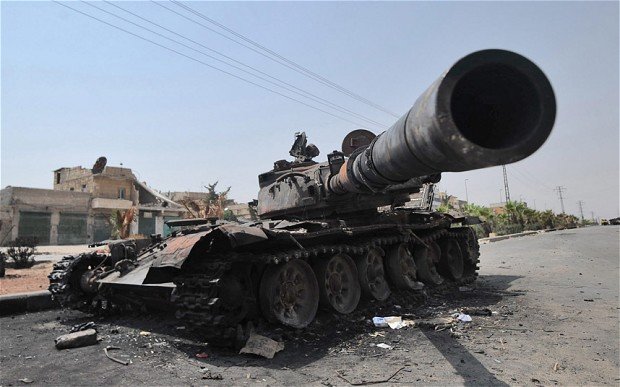Syria’s unpredictable future
 To describe the situation in Syria as an unholy mess would be an understatement. It is tragic, but it is also very frustrating. It cannot be compared to what seemed like the relative simplicities of the Egyptian revolution or even the Libyan one, with pro-democracy activists on one side, a ruthless tyrant on the other. Certainly President Bashar al-Assad fits that description, and certainly what motivated popular protest was the desire to see the back of him at last.
To describe the situation in Syria as an unholy mess would be an understatement. It is tragic, but it is also very frustrating. It cannot be compared to what seemed like the relative simplicities of the Egyptian revolution or even the Libyan one, with pro-democracy activists on one side, a ruthless tyrant on the other. Certainly President Bashar al-Assad fits that description, and certainly what motivated popular protest was the desire to see the back of him at last.
But this is a complex conflict where religious and ethnic factors loom large. It is plain enough what they are against, but far from clear what opponents of the Assad regime are fighting for.
They are united neither in their aims nor in their strategy, and virtually every other Middle Eastern power has a finger somewhere in this pie. Are they Sunni moderates, secularists, members of the Muslim Brotherhood or even with al-Qaeda? Are they pawns of the West or Israel, or their sworn enemies?
Some are Christian, though Mr Assad has a reputation for protecting minority rights; some want to drive the Christians out. Some are Shia, though that is the section of Islam he belongs to. Is Mr Assad in Russia’s pocket, or Iran’s?
What this confusion demonstrates is the impracticability of any simple intervention from outside, say by providing air power as in Libya or by American pressure on the military as in Egypt. It is not even easy to prescribe how and where humanitarian aid should be delivered, except of course to the crowded refugee camps over Syria’s borders where it needs to flow abundantly.
The innocent victims are at present the citizens of Aleppo, Syria’s second city. The rebels held important districts until the Syrian army launched overwhelming force against them. As ever, women and children are particularly at risk.
Aleppo has a significant Christian population, and no doubt Pope Benedict had them in mind when he called for an end to the bloodshed and appealed for the international community to help resolve the conflict. In more vivid language, the Vatican’s representative on the ground, the nuncio Archbishop Mario Zenari, urged religious leaders to take the initiative. “With the weight of your moral authority, come together and issue in the name of God a unanimous and severe warning to all parties in the conflict to cease violence and repression,” he pleaded. The conflict “is dragging the country towards destruction, towards unspeakable suffering and towards death”.
This appeal had the advantage that it recognises that peace must ultimately come from within Syria itself, and even if the balance of power shifts from the Alawite minority around Mr Assad to the Sunni majority who are mainly on the rebel side, both sides have to learn to live together eventually, and indeed to live with the Christians.
The nuncio’s words chime with reports from the United Nations mission in Syria, which has a mandate to pursue reconciliation but finds no appetite for it. Both sides are determinedly “confrontational” in their attitudes, a UN spokesman said. Peace will only appear when this process goes into reverse. It could happen in Syria, and religious leaders may well play a part in it. But whether the last state of affairs will be better than the first is at this point unknown and unknowable.
- Christians without compromises
- UK immigration policy is punishing Britons with non-EU spouses
- Negative modern attitudes towards faith
- LIBYA 2011 Poem by SHARI EPPEL
- A Point of View: Does atheism have to be anti-religious?
- Seeing Spring and Easter
- London 2012 and the triumph of British diversity
- "Never be afraid of tenderness"
- Negative modern attitudes towards faith
- ‘The “Catholic” model of an economic market is one that services the common good’


 Votes : 0
Votes : 0









